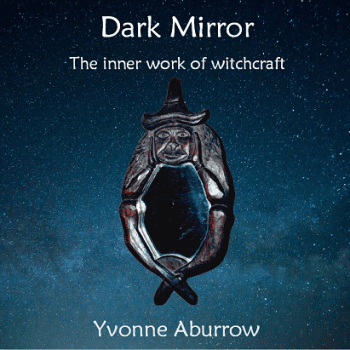Hello, beautiful creatures. I’ve spent a couple of posts now writing about the importance of nuance and the perils of viewing a complex world through a simplistic perspective. My posts have touched lightly enough on the applicability of these ideas to Pagan, polytheist, and magical practice that the reader can be forgiven for wondering what the hell I’m wittering on about.
My sincere thanks to all of you patient folks. Here, at long last, is the punchline:
The loss of nuance leads by a direct route to a loss of complexity in both our thought and our discourse around our thoughts. If we only see the world in black and white, we cannot see all the shades of grey between them. We’re imprisoned in a model of reality which throws out the vast majority of the information between 0 and 1, the wide spectrum of color that surrounds us. We are stuck at the periphery of the pendulum swing, exiled from the spaces between.
Those spaces between—the liminal spaces—are where mystery and magic reside. They are where the powers of transformation and initiation originate. They are the threshold we cross, the gates we pass through, the realm of Faërie. They are the wellspring of the numinous, and in our desperate desire for safety and stability, we have allowed the self-appointed guardians of culture to slap a slab of concrete atop them, ring them with chain-link fences, and dole out access to their life-giving waters.
When I say that the loss of nuance is killing us all, that’s what I mean.
Discernment as the First Power of the Magus
There are more things in heaven and earth, Horatio,
Than are dreamt of in your philosophy.
– William Shakespeare, Hamlet (1.5.167-8), Hamlet to Horatio
Very few situations in life are as unequivocally binary as most participants might like to believe… or, more to the point, as they might like others to believe. Most things in life—and most people, for that matter—are complex, complicated, and messy. The notion that they are simple, and therefore reducible to a straightforward “good” vs. “evil” equation, is a dangerous delusion at best. At worst, it’s a tool used by deceitful people with an agenda they’d rather not disclose, pursuing ends they know perfectly damn well they’d be shot down for pursuing openly.
Of course, there are situations where just such binary judgment calls are needful. Some situations are genuinely awful, some people are truly toxic. Unfortunately, there’s no hard-and-fast set of rules for making those judgments in a complex, nuanced universe, but the traditional framework of Eliphas Lévi‘s four powers of the Magus can be helpful. The first power of the Magus is the power to know1. Understood not only as mere knowledge but as discernment, the ability to comprehend obscurity and distinguish between complex ideas, it’s one of the most precious skills one can acquire. Discernment is the ability to judge situations without reducing their complexity to fit a simplistic model of reality. Discernment empowers us to navigate the spaces between, to separate false gold from true. With discernment, we can see the truth and falsity of a situation for ourselves, even when those two qualities are woven together.
In a culture which pushes us to believe in the binary choices of yes or no, black or white, good or evil—to pick a side, in other words—discernment is the power to see things as they truly are and choose our own path. Only with discernment can we truly give or withhold our consent and say “yes,” or “no,” or “yes-and.”

That’s not to say it’s easy, or without complications—because of course it isn’t, right? Seeing things through a lens of “yes-and” can make life a lot less comfortable, because it makes snap decisions and binary thinking a lot harder to endorse. It’s easy to say “this is a bad person” or “that’s a stupid decision” when you’re judging the person or decision without all the relevant information. It’s much more difficult, and often more uncomfortable, to go through a process of discernment before making that judgment call… and, as any Magus will be more than happy to tell you, a process being “difficult” and “uncomfortable” are often a sign that you’re on the right track.
How can you tell the right track from the wrong track?
Well, that’s kind of what discernment is for. Next time, I’ll talk about a few tools that I’ve used to help me develop my own powers of discernment.
Until then, dear ones, take good care of yourselves. ♥
https://youtu.be/H4P4CTSb3dY
- The original version of this sentence read, “The first power of the Magus is noscere, to know.” However, Christopher rightly pointed out in comments that Lévi’s original was in French, and the Latin was a back-translation courtesy of good ol’ Uncle Al. As such, I’ve updated the sentence to make it a little clearer and more accurate.












